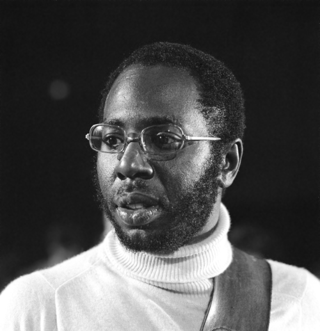
Curtis Lee Mayfield was an American singer-songwriter, guitarist, and record producer, and one of the most influential musicians behind soul and politically conscious African-American music. Dubbed the "Gentle Genius", he first achieved success and recognition with the Rock and Roll Hall of Fame-inducted group the Impressions during the civil rights movement of the late 1950s and the 1960s, and later worked as a solo artist.

Super Fly is a 1972 American blaxploitation neo-noir crime drama film directed by Gordon Parks Jr. and starring Ron O'Neal as Youngblood Priest, an African American cocaine dealer who is trying to quit the underworld drug business. The film is well known for its soundtrack, written and produced by soul musician Curtis Mayfield. It was released on August 4, 1972.
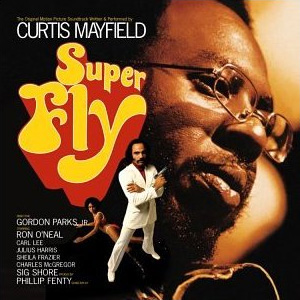
Super Fly is the third studio album by American soul musician Curtis Mayfield, released in July 1972 on Curtom Records. It was released as the soundtrack for the Blaxploitation film of the same name. Widely considered a classic of 1970s soul and funk music, Super Fly was a nearly immediate hit. Its sales were bolstered by two million-selling singles, "Freddie's Dead" and the title track. Super Fly is one of the few soundtracks to out-gross the film it accompanied.
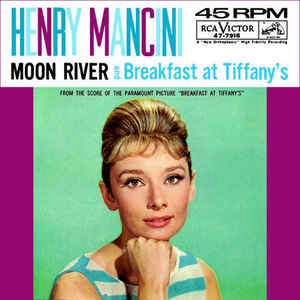
"Moon River" is a song composed by Henry Mancini with lyrics by Johnny Mercer. It was originally performed by Audrey Hepburn in the 1961 movie Breakfast at Tiffany's, winning an Academy Award for Best Original Song. The song also won the 1962 Grammy Awards for Record of the Year and Song of the Year.
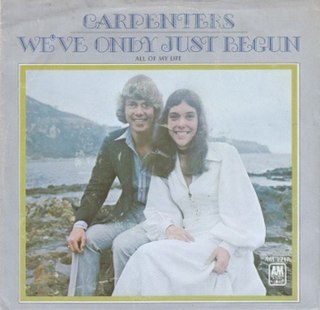
"We've Only Just Begun" is a single by the Carpenters, written by Roger Nichols (music) and Paul Williams (lyrics). It was ranked at No. 414 on Rolling Stone magazine's list of "The 500 Greatest Songs of All Time."
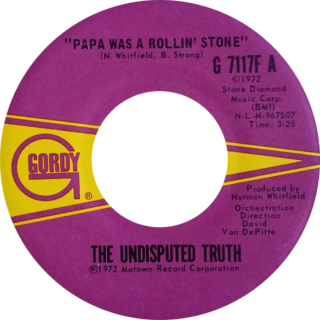
"Papa Was a Rollin' Stone" is a song originally performed by Motown recording act the Undisputed Truth in 1972, though it became much better known after a Grammy-award winning cover by the Temptations was issued later the same year. This latter version of the song became a number-one hit on the Billboard Hot 100.
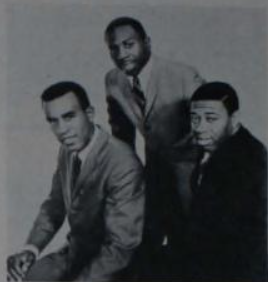
The Impressions were an American music group originally formed in 1958. Their repertoire includes gospel, R&B, doo-wop, and soul.
Superfly or Super fly may refer to:
"Theme from A Summer Place" is a song with lyrics by Mack Discant and music by Max Steiner, written for the 1959 film A Summer Place, which starred Sandra Dee and Troy Donahue. It was recorded for the film as an instrumental by Hugo Winterhalter. Originally known as the "Molly and Johnny Theme", this lush extended cue, as orchestrated by Murray Cutter, is not the main title theme of the film, but an oft-heard secondary love theme for the characters played by Dee and Donahue.
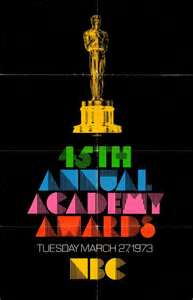
The 45th Academy Awards were presented Tuesday, March 27, 1973, at the Dorothy Chandler Pavilion in Los Angeles, California, honoring the best films of 1972. The ceremonies were presided over by Carol Burnett, Michael Caine, Charlton Heston, and Rock Hudson.

Music from the Warner Bros. Picture "Sparkle" is a soundtrack album and twenty-fourth studio album by American singer Aretha Franklin, written and produced by Curtis Mayfield. Released on May 27, 1976, the disc is the soundtrack album for the 1976 Warner Bros. motion picture Sparkle, starring Irene Cara. The songs on the soundtrack feature the instrumental tracks and backing vocals from the film versions, with Franklin's voice taking the place of the original lead vocalists.
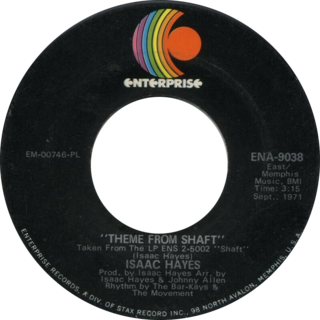
"Theme from Shaft", written and recorded by Isaac Hayes in 1971, is the soul and funk-styled theme song to the Metro-Goldwyn-Mayer film Shaft. The theme was released as a single two months after the movie's soundtrack by Stax Records' Enterprise label. "Theme from Shaft" went to number two on the Billboard Soul Singles chart and to number one on the Billboard Hot 100 in the United States in November 1971. The song was also well received by adult audiences, reaching number six on Billboard's Easy Listening chart. The song is considered by some to be one of the first disco songs.

"Love Train" is a hit single by the O'Jays, written by Kenny Gamble and Leon Huff. Released in 1972, it reached No. 1 on both the R&B Singles and the Billboard Hot 100 in February and March 1973 respectively, and No. 9 on the UK Singles Chart and was certified gold by the RIAA. It was the O'Jays' first and only number one record on the US pop chart. The song has been considered one of the first songs of disco music.

"Superfly" is a song by Curtis Mayfield, the title track from his 1972 soundtrack album for the film of the same name. It was the second single released from the album, following "Freddie's Dead ", and reached #8 on the Billboard Hot 100 and #5 on the Best Selling Soul Singles chart. The lyrics celebrate the craftiness and determination of the film's main character. The song plays over the film's closing credits.

"Be Thankful for What You Got" is a soul song written and first performed by William DeVaughn. The record sold nearly two million copies on its release in spring of 1974, reaching #1 on the U.S. R&B charts and #4 on the Billboard Hot 100 chart. In 2021, it was listed at No. 374 on Rolling Stone's "Top 500 Greatest Songs of All Time".

"Where Is the Love" is a popular song written by Ralph MacDonald and William Salter, and recorded by Roberta Flack and Donny Hathaway. Released in 1972 from their album, Roberta Flack & Donny Hathaway. It peaked at number five on the Billboard Hot 100 singles chart and spent a week each at number one on the Billboard Easy Listening chart and R&B chart. Billboard ranked it as the No. 58 song for 1972. The song won a Grammy Award for Best Pop Performance by a Duo or Group with Vocals.

"You Can't Hide Love" is a single by soul group Creative Source released in 1973 on Sussex Records. The song reached No. 48 on the Billboard Hot R&B Singles chart.
"Peter Gunn" is the theme music composed by Henry Mancini for the television show of the same name. The song was the opening track on the original soundtrack album, The Music from Peter Gunn, released in 1959. Mancini won an Emmy Award and two Grammys for Album of the Year and Best Arrangement.
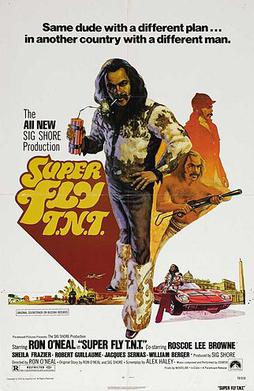
Super Fly T.N.T. is a 1973 American blaxploitation crime drama film directed and starring Ron O'Neal. O'Neal reprises his role of Youngblood Priest from the 1972 film Super Fly. The film was both a critical and commercial failure according to some critics.

"Super Fly Meets Shaft" is a break-in record co-written by Dickie Goodman and recorded by John & Ernest. It consists of lines from popular R&B/soul songs of the day, which tell a story about the main characters from the films Super Fly (1972) and Shaft (1971).

















